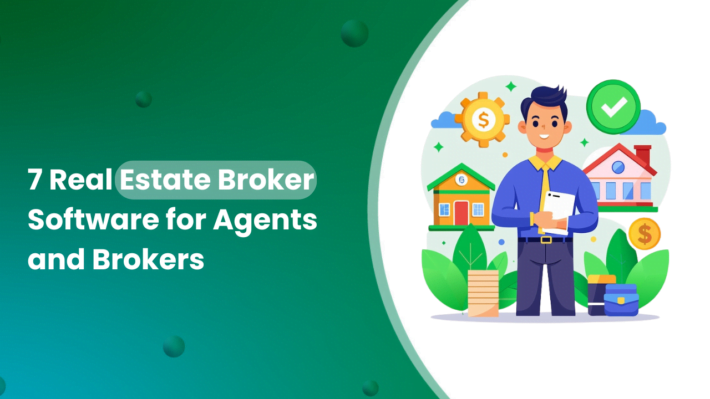Top 15 Real estate CRM Software For Real Estate Agents

As a real estate professional, do you struggle to keep track of busy clients and endless paperwork? Does your business lack a centralized system to manage properties, deals, contacts, and tasks? Without organization, deals and relationships may slip through the cracks.
A real estate CRM is a central hub to oversee all interactions between leads and clients across the deal lifecycle. This Cloud-based sales CRM platform enables organization and tracking of leads, listings, transactions paperwork plus agent tasks and referrer info in one searchable database. A CRM designed for real estate centralizes all client interactions, listings, transactions, referrals, and other touchpoints into one accessible command center.
This solves pressing pain points:
- Difficulty tracking communications across email, phone, texts
- Forgetting to follow up on time-sensitive deals
- Losing paperwork and contacts
- Limited visibility into referral networks
- No central listing database
With deal and task automation, you can be proactive responding to clients. Built-in workflows, calendars, pipeline visualizations and reports provide organization you lack. Focus more on nurturing client relationships without constant fire drills. A real estate CRM delivers simplicity and accuracy so you convert more prospects.
“According to studies 87% of real estate agents say CRM software has increased sales productivity in their business.”
CRM Software For Real Estate: What is it?
Real estate CRM Customer Relationship Management is like a special tool that helps real estate professionals such as agents, brokers, and property managers to keep track of all the important information about their clients and properties. It’s kind of like a digital hub where they can store details about people they’re helping to buy or sell homes, like their contact information, preferences, and any notes about their needs or wants. It also helps Real estate agents organize their tasks, like scheduling appointments and following up with clients. Basically, it’s a handy system that helps real estate agents stay organized and provide better service to their clients.
👉 Read more: B2b CRM Software
Here is a table comparing traditional real estate tools vs an all-in-one CRM For real estate :
| Traditional Real Estate Tools | All-In-One CRM Platform |
| Using separate contact manager and Excel sheets to store data | A unified contact database with all prospect & client information |
| Manually entering listings into a spreadsheet | Centralized listing database integrated with MLS |
| Email and calendar in separate programs | Built-in email and calendar connected to contacts |
| Separate accounting software | Integrated accounting and reporting |
| No sales pipeline visibility | Deal pipeline dashboards for forecasting |
| Disjointed systems and missing information | All data and tools accessible on one platform |
| Difficult to collate marketing campaigns | Integrated email and social media marketing |
| Hard to spot opportunities and trends | Analytics and reports to uncover insights |
| Data and tools don’t sync across devices | Mobile access keeps information up-to-date |
| Time wasted switching between apps | Intuitive interface reduces tool fatigue |
With Real estate CRM Software, real estate agents can track email exchanges, phone interactions, meetings and property showings so that each communication is professional and intentional. This level of visibility helps identify opportunities for appropriate follow-up to keep deals progressing. It also provides powerful data around lead response times, deals closed and client retention over time so that marketing and sales processes can be optimized.
While closing deals is critical, real success in real estate comes from creating lifelong advocates. A CRM is the tool that not only helps agents build trust and strengthen relationships in the moment, but help you to create satisfied clients who recommend you to all their friends when they have real estate needs!
but first learn about how to generate quality real estate leads.
Benefits of Using: Best CRM for Real Estate
A CRM helps real estate agents stay organized, provide better client service, and manage leads effectively ultimately leading to increased productivity and profitability. here are some benefits:-
Organized Contacts: A CRM keeps all your client contacts and information in one place, making it easy to access and update details without hunting through scattered files or notes.
Detailed Client Profiles: CRMs allow you to create detailed profiles for each client, including their property preferences, budget, and communication notes, helping you provide personalized service.
Task and Deadline Tracking: With a CRM, you can set reminders and track important tasks and deadlines related to each client, ensuring nothing slips through the cracks.
Automated Communication: CRMs can automate email campaigns, property updates, and follow-ups, keeping your clients informed without manual effort.
Lead Management: Capture and nurture lead more effectively by tracking their interactions and interests within the CRM, making it easier to convert them into clients.
Analytics and Reporting: CRMs provide valuable insights through analytics and reports, helping you understand your performance, identify areas for improvement, and make data-driven decisions.
Mobile Access: Many CRMs offer mobile apps, allowing you to access client information and manage tasks on the go, ensuring you’re always prepared for meetings or showings.
👉 Also Read: Benefits of CRM in Real Estate
Real estate CRM Software: What are the most important features?
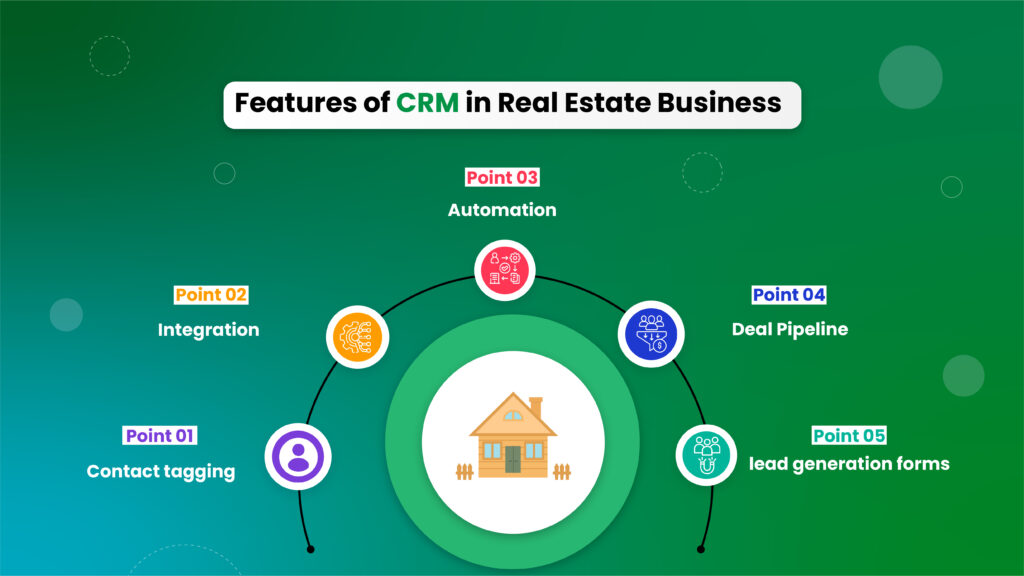
Choosing the appropriate CRM Software For Real Estate is crucial for optimizing and organizing your real estate business. When comparing CRM systems, you should examine many key characteristics to make an informed decision:
Contact tagging: Contact tagging serves as essential for categorizing your leads and clients based on a variety of characteristics, including lead source, property preferences, buying stage, and more. You can segment your contacts with this tool for targeted marketing and personalized communication. It’s a critical component of a real estate CRM.
Integration: A real estate CRM must have integration capabilities. Ensure that your CRM can integrate with other tools and services that you use daily, such as email, calendar apps, document management systems, and even accounting software. This interoperability saves time and reduces the need for human data entry.
Automation: In the real estate market, automation is a game changer. Look for a Real estate CRM that allows you to automate things like follow-up messages, and appointment scheduling. Routine process automation frees up your time to focus on high-value tasks while ensuring that no leads fall through the cracks.
Sales Pipeline: Managing the sales pipeline is critical for real estate professionals. Your CRM should provide a clear and customized pipeline view that allows you to trace each deal’s progress from initial contact to closing. This feature keeps you organized and on top of every transaction, helping you move deals forward efficiently.
lead generation forms: A good CRM should include lead generation forms that are simple to integrate into your website or landing pages. where Potential clients can express their interest using these forms, providing you with essential contact information. These leads should be captured by the CRM and integrated into your contact database for immediate follow-up.
Read also: Best CRM Software for Small Businesses
Top 15 Best CRM Software For Real Estate Agents
Selecting the right CRM Software for real estate agents to manage leads, clients, and transactions efficiently is crucial. Here’s a comprehensive overview of the top 10 CRMs for real estate professionals.
1. SaleTown CRM: Best Real Estate CRM Software for Realtors
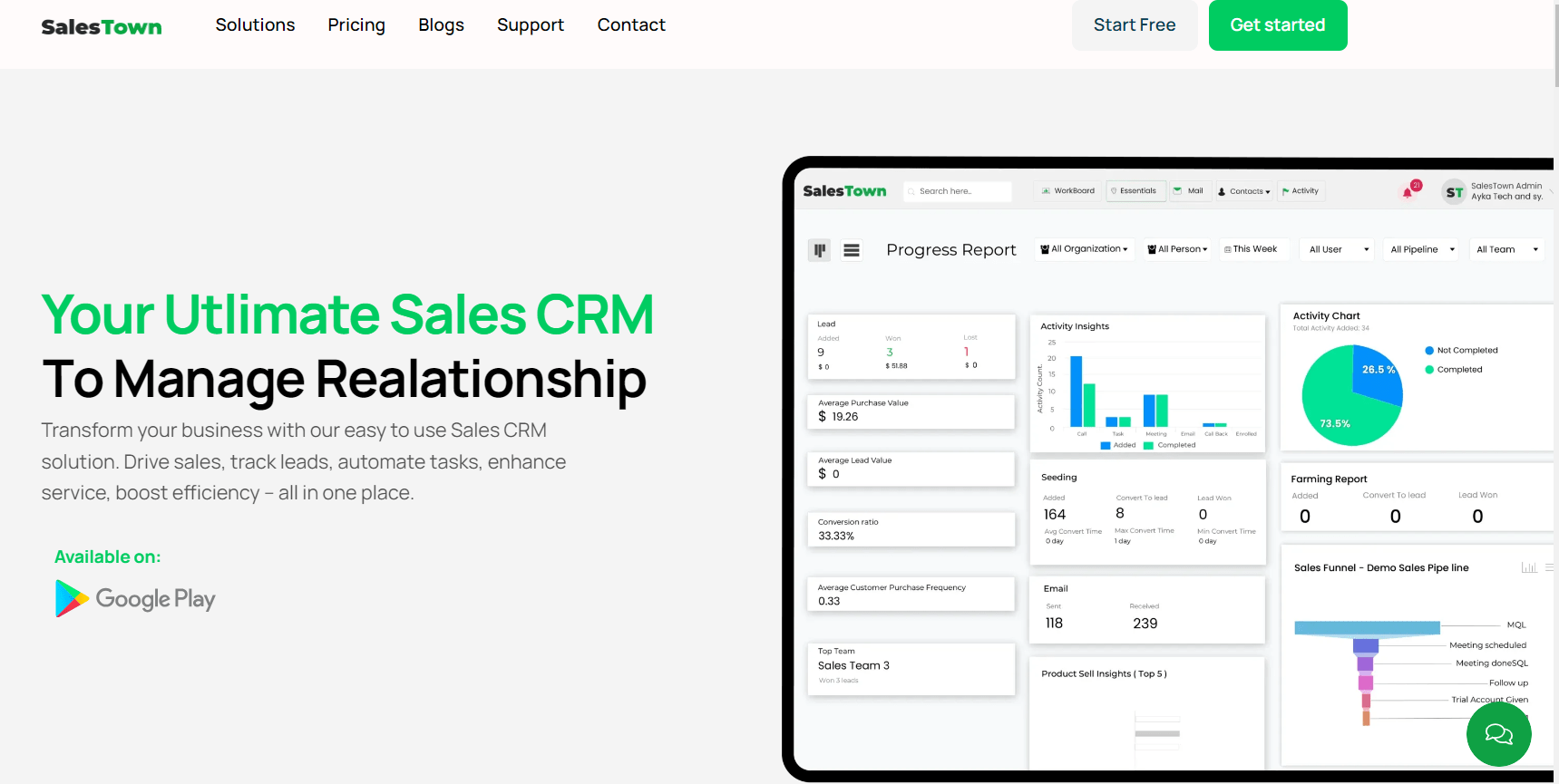
Overview: SaleTown CRM is tailored specifically for real estate agents, offering tools to streamline client management, lead tracking, and transaction processing.
Key Features:
- Customizable Dashboards: Provides a personalized view of sales activities, metrics, and key performance indicators, allowing agents to focus on what matters most.
- Automated Lead Capture: Automatically imports leads from various sources such as websites, social media, and listing portals, ensuring no lead is missed.
- Contact Management: Maintains comprehensive profiles for each contact, including personal details, communication history, and property preferences.
- Pipeline Management: Visualizes the entire sales process from initial contact to closing, Customizable stages and drag-and-drop functionality make it easy to update lead status and manage the sales pipeline effectively.
- Email Marketing Integration: Enables agents to create, send, and track email campaigns directly from the CRM, enhancing communication with clients.
- Task and Appointment Management: Helps agents schedule and manage tasks and appointments, ensuring they stay organized and never miss a deadline.
- Document Management: Provides a centralized repository for storing and managing important documents such as contracts, agreements, and disclosures. Secure storage and easy access to documents.
- Robust Reporting and Analytics: Offers detailed reports and analytics on sales performance, lead sources, and marketing campaigns, aiding data-driven decision-making.
Pros:
- User-friendly interface
- Real estate lead management
- Strong customer support
- Integrations with popular real estate platforms like (99 acres, magic bricks, housing.com etc)
Cons:
- Enterprise-level real estate companies may face some challenges
Best for: Agents seeking a cost-effective, easy-to-use CRM with essential features for client and lead management.
2. Follow Up Boss: Best CRM for Real Estate Agents
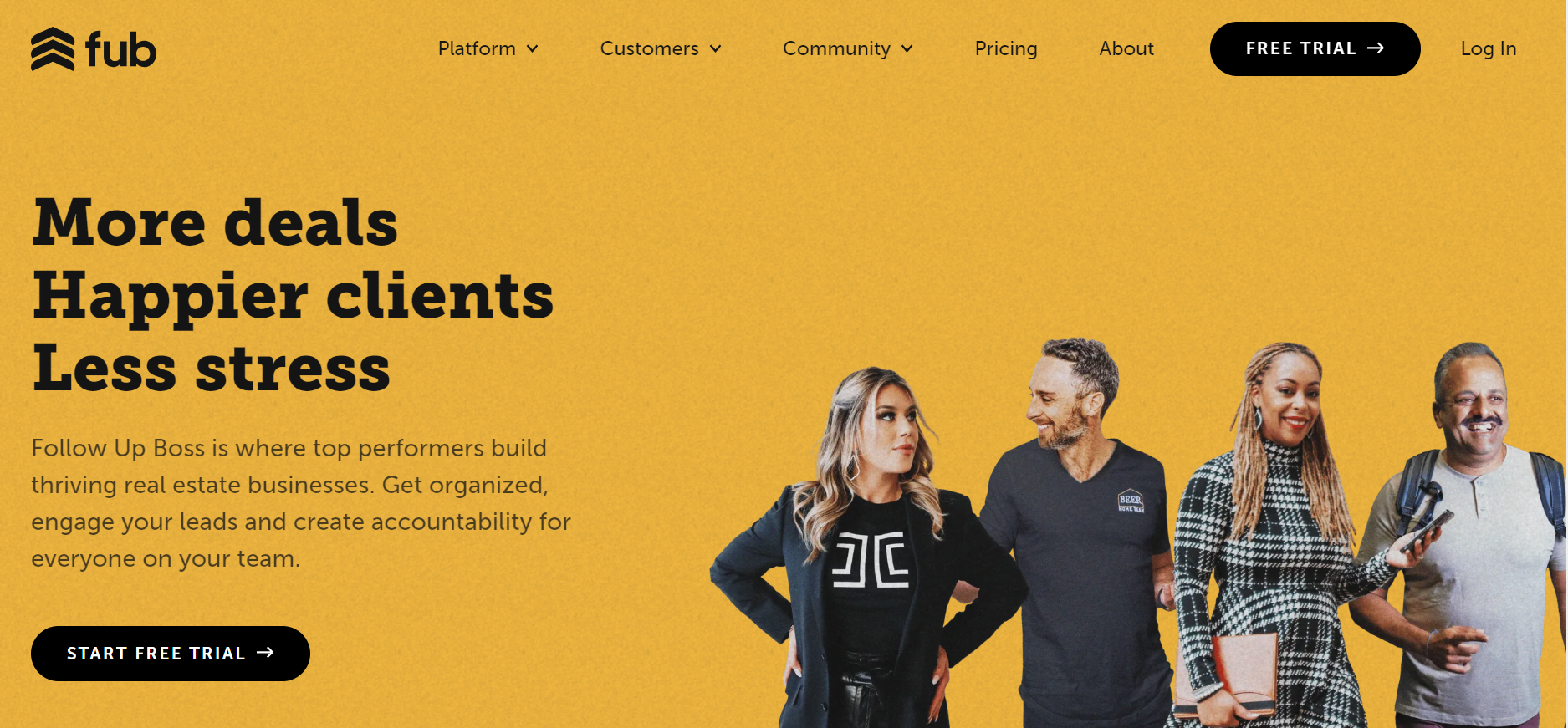
Overview: Follow Up Boss is designed to help real estate agents nurture leads and manage relationships with clients efficiently.
Key Features:
- Automated Lead Distribution: Automatically assigns leads to agents based on predefined criteria, ensuring timely follow-up.
- Detailed Reporting and Analytics: Provides insights into agent performance, lead sources, and conversion rates, helping to optimize sales strategies.
- Integration with Major Real Estate Lead Sources: Connects with platforms like Zillow, Realtor.com, and Trulia, enabling seamless lead import and management.
- Built-in Calling and Texting: Allows agents to call and text clients directly from the CRM, with call logging and tracking for accountability.
Pros:
- Excellent customer support
- Seamless integrations
- Easy-to-use interface
Cons:
- Higher cost compared to some competitors
- Limited customization options
Best for: Teams and individual agents who want robust lead management and communication tools.
3. LionDesk: Best Real Estate Lead Management Software

Overview: LionDesk offers a comprehensive CRM solution with advanced communication tools and automation capabilities.
Key Features:
- Integrated Video Email and Texting: Enables agents to send personalized video messages via email and text, increasing engagement with clients.
- Automated Lead Follow-Up: Utilizes AI and automation to nurture leads with timely and relevant communication.
- Task Management and Reminders: Helps agents manage their daily activities with to-do lists, reminders, and calendar integration.
- Contact Management with Robust Segmentation: Allows for detailed categorization and segmentation of contacts, facilitating targeted marketing efforts.
Pros:
- Affordable pricing
- Strong communication features
Cons:
- Learning curve for new users
- Occasional glitches reported
Best for: Agents who prioritize communication and need a budget-friendly CRM.
4. Top Producer: Best CRM Software For Real Estate
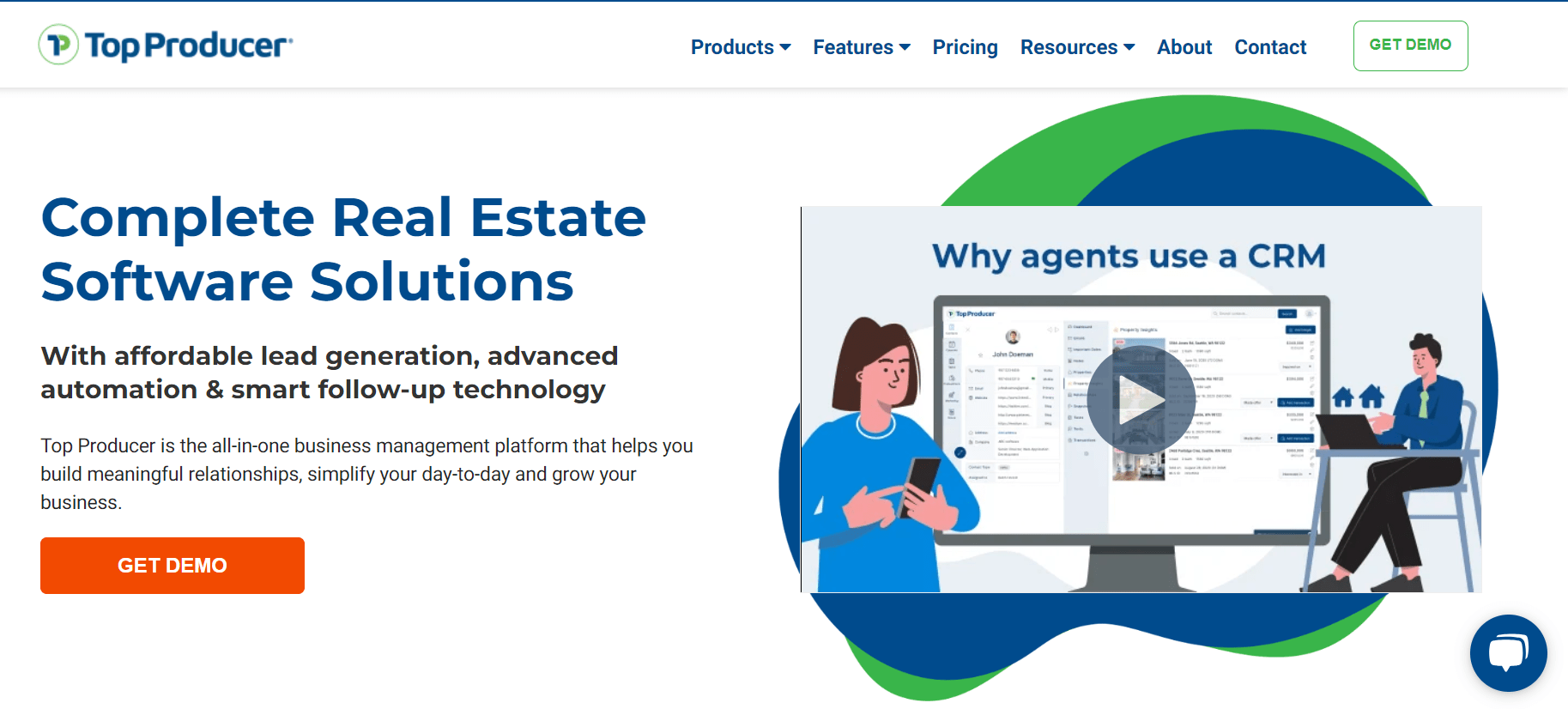
Overview: Top Producer is a long-standing CRM in the real estate industry, known for its comprehensive features and integrations.
Key Features:
- MLS Integration: Syncs with Multiple Listing Service (MLS) data, providing up-to-date property information within the CRM.
- Automated Marketing Campaigns: Helps agents create and deploy email and social media campaigns to nurture leads and stay top-of-mind with clients.
- Lead Conversion Tools: Offers features like lead scoring and tracking to help prioritize and convert leads more effectively.
- Task and Transaction Management: Provides tools for managing tasks and transactions, ensuring smooth progress from lead to closing.
Pros:
- Extensive feature set
- Strong MLS integrations
- Reliable customer support
Cons:
- Outdated user interface
- Can be complex for beginners
Best for: Experienced agents and teams who need a full-featured CRM with MLS integration.
5. Zoho CRM: Best Customizable CRM for Real Estate
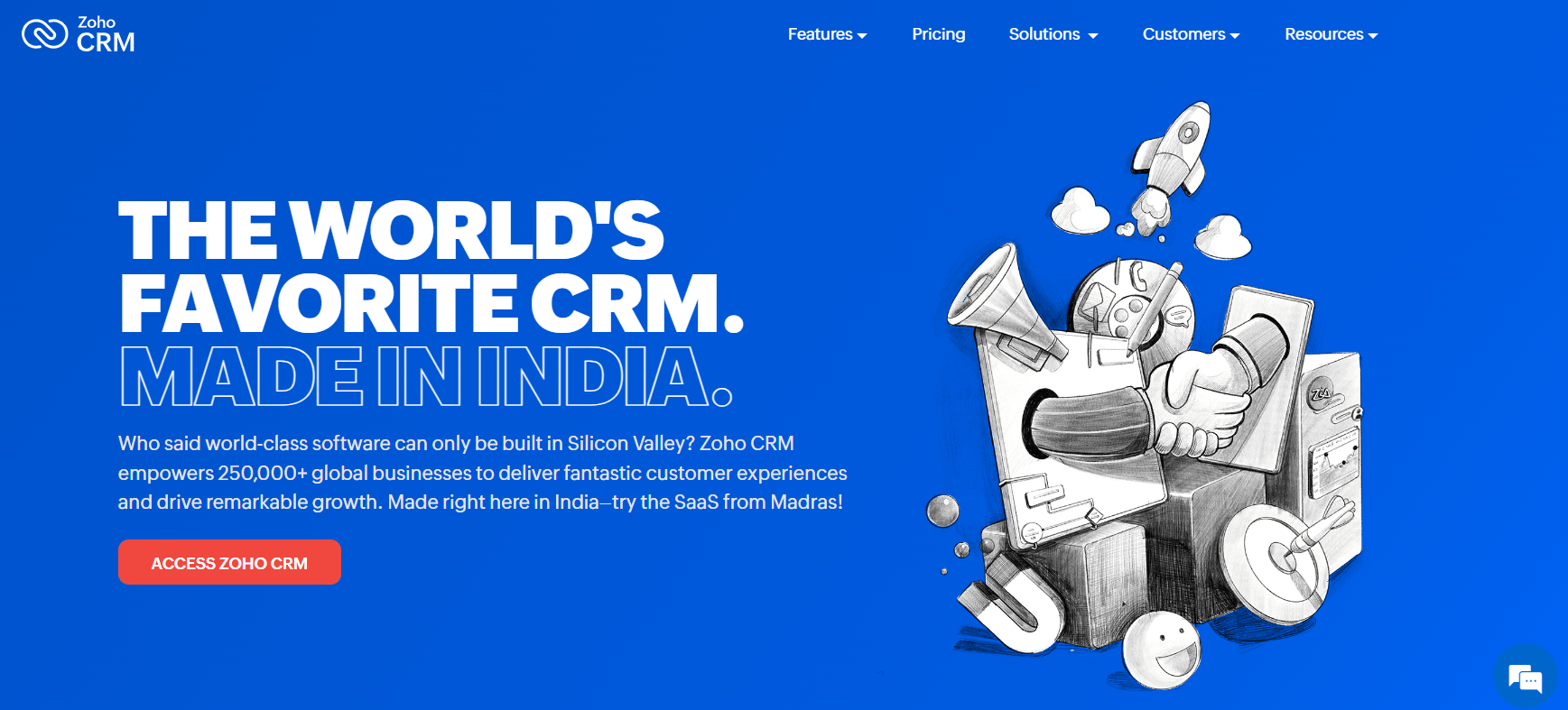
Overview: Zoho CRM is a versatile platform that can be customized extensively for real estate professionals.
Key Features:
- Customizable Workflows and Modules: Allows agents to tailor the CRM to their specific processes, enhancing productivity and efficiency.
- Advanced Analytics and Reporting: Delivers powerful insights through customizable reports and dashboards.
- Multichannel Communication Tools: Supports communication via email, phone, live chat, and social media from a single platform.
- AI-Powered Sales Assistant: Zia, Zoho’s AI assistant, helps with lead predictions, email sentiment analysis, and more.
Pros:
- Highly customizable
- Affordable entry-level pricing
- Strong automation capabilities
Cons:
- Customization can be complex
- Limited real estate-specific features
Best for: Tech-savvy agents who need a highly customizable CRM at an affordable price.
6. Propertybase: Best All-in-One Real Estate CRM
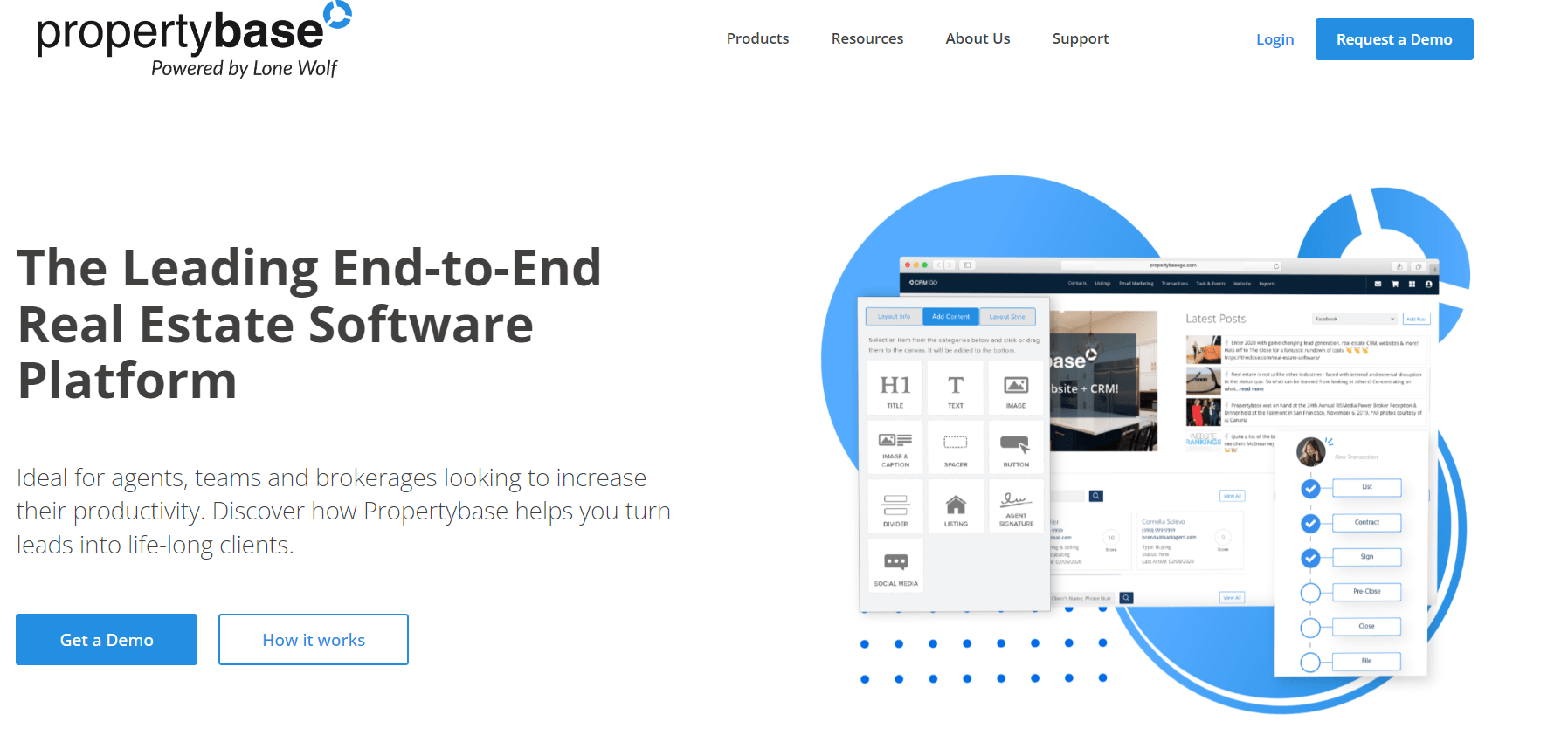
Overview: Propertybase is built specifically for the real estate industry, offering a suite of tools to manage leads, listings, and transactions.
Key Features:
- MLS Integration: Provides real-time MLS data within the CRM Software for easy access to property information.
- Customizable Lead Routing: Automatically assigns leads based on criteria like location, price range, and agent availability.
- Website and IDX Integration: Integrates with websites to capture leads and provide IDX (Internet Data Exchange) listings.
- Detailed Reporting and Analytics: Offers comprehensive reports on sales activities, lead sources, and marketing effectiveness.
Pros:
- Real estate-specific features
- Strong MLS and IDX integration
- Comprehensive reporting
Cons:
- Higher price point
- Can be complex to set up
Best for: Larger teams and brokerages needing a full-featured, real estate-specific CRM.
7. kvCORE: Best CRM Software for Real estate Lead Management
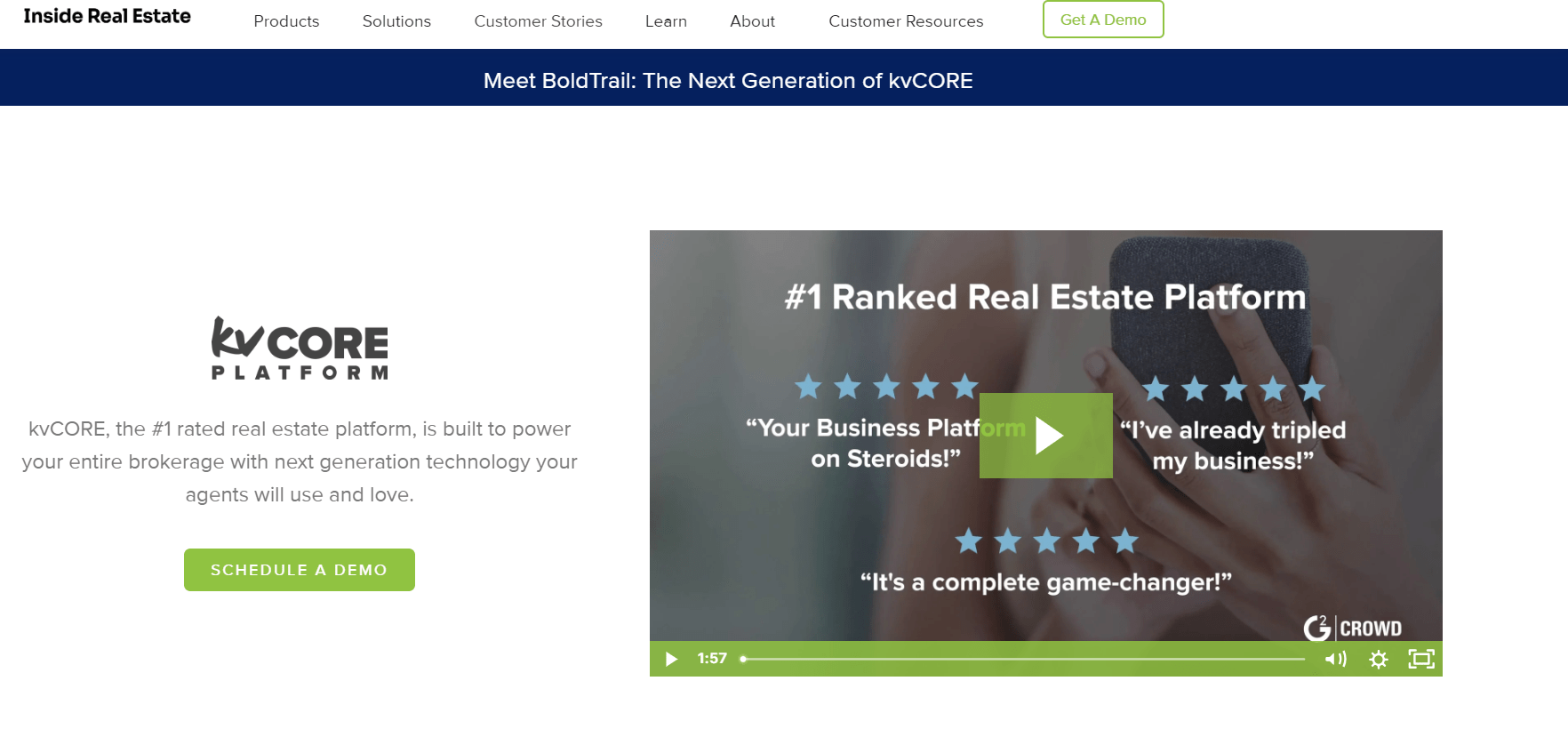
Overview: kvCORE is a powerful real estate platform offering a complete suite of tools for managing leads and automating marketing.
Key Features:
- Smart CRM with Behavioral Automation: Uses AI to automate follow-ups and suggest actions based on lead behavior.
- IDX Website and Landing Pages: Offers customizable websites with IDX integration to capture and nurture leads.
- Automated Lead Nurturing: Sends personalized messages and content to leads based on their interactions and preferences.
- Mobile App for On-the-Go Access: Allows agents to manage their business from anywhere with a feature-rich mobile app.
Pros:
- Comprehensive feature set
- Strong automation and AI capabilities
- Great for lead generation
Cons:
- High cost for smaller teams
- Steeper learning curve
Best for: Real estate teams and brokerages that need advanced lead generation and automation features.
8. BoomTown: Best Real Estate Broker CRM
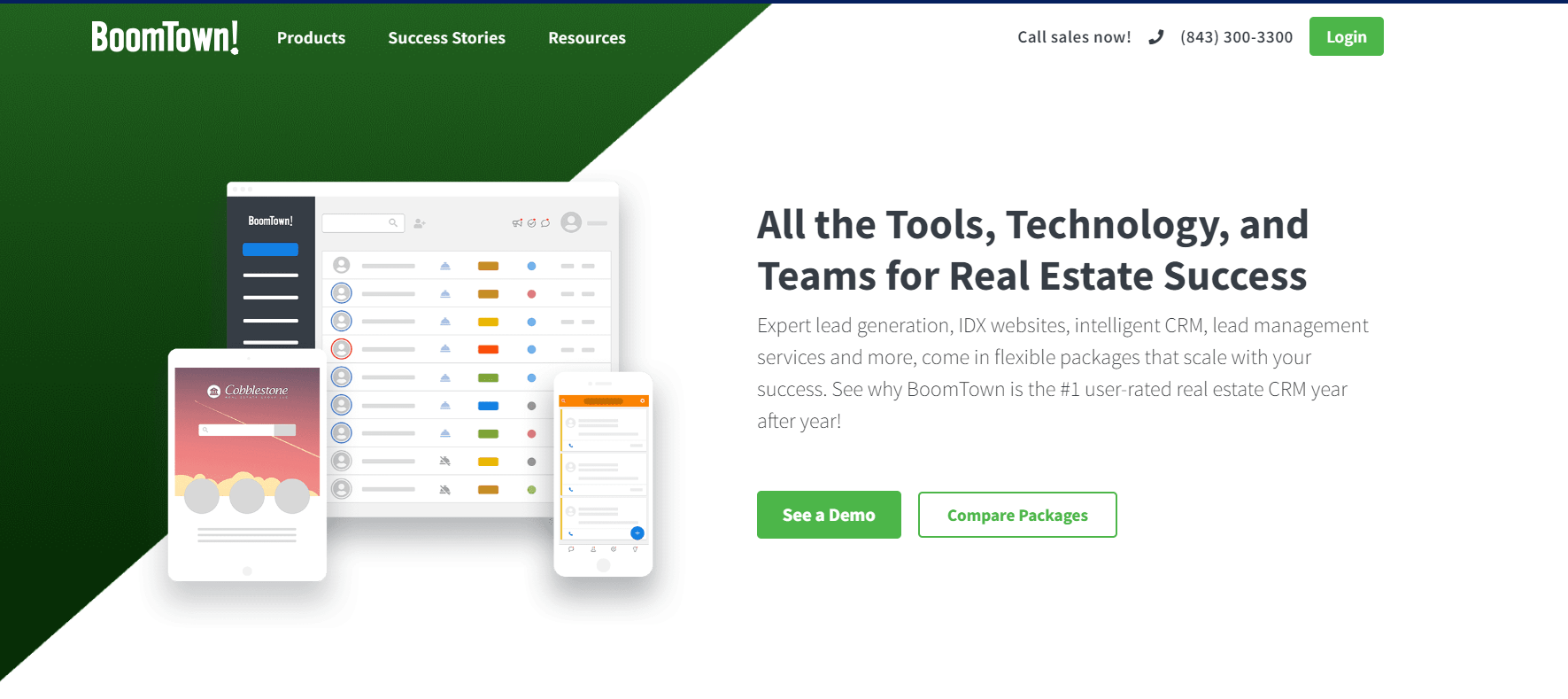
Overview: BoomTown offers a robust CRM solution combined with marketing automation to help real estate professionals manage their business efficiently.
Key Features:
- Predictive CRM: Uses data analysis to predict which leads are most likely to convert, helping agents prioritize their efforts.
- Automated Marketing Campaigns: Facilitates automated email and text campaigns to engage leads over time.
- Lead Generation Tools: Includes tools to generate leads through online advertising and SEO.
- Mobile App: Provides a mobile app for managing leads, tasks, and communications on the go.
Pros:
- Excellent lead generation capabilities
- Strong predictive analytics
- Comprehensive marketing tools
Cons:
- Very high cost
- Best suited for larger teams
Best for: Large real estate teams and brokerages focused on lead generation and marketing automation.
9. Wise Agent: Best Budget-Friendly Real Estate Lead Management Software
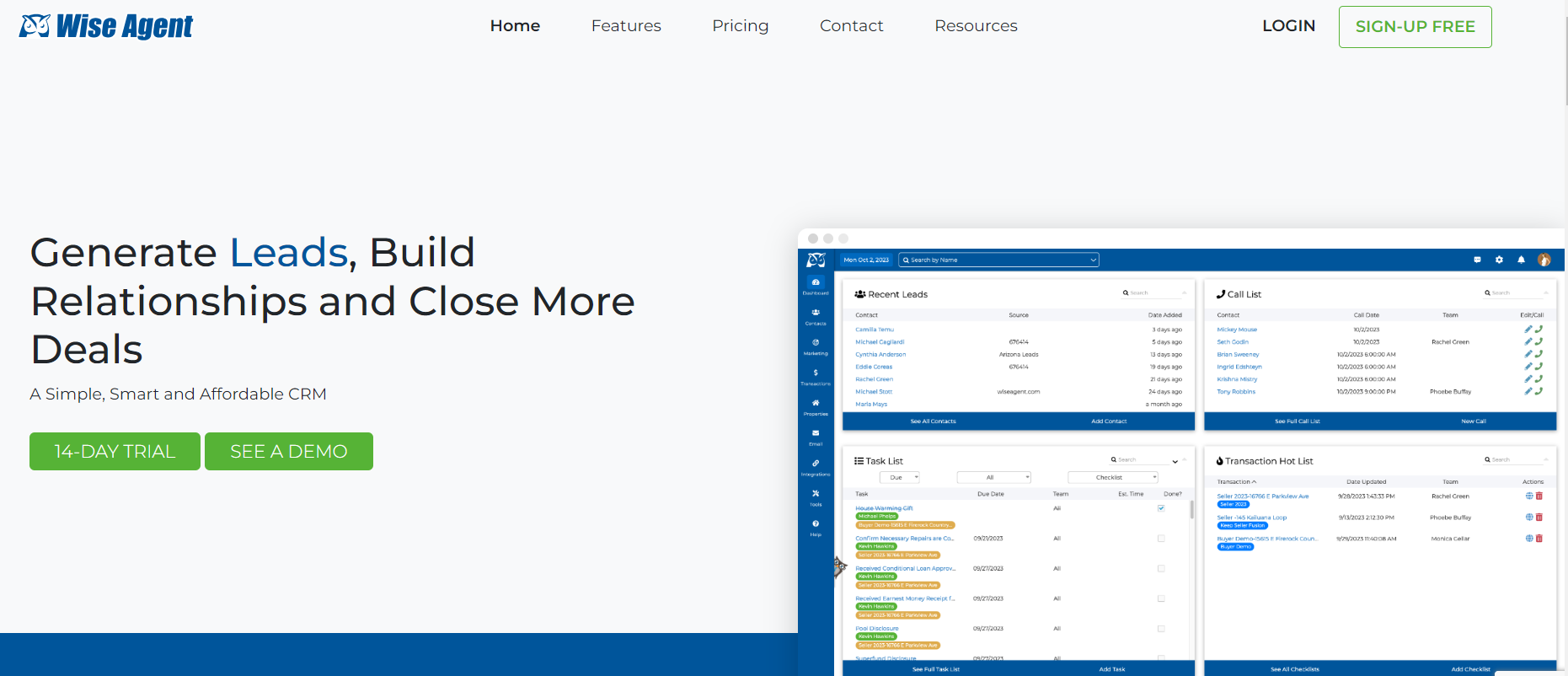
Overview: Wise Agent is an affordable CRM solution with a focus on ease of use and essential real estate features.
Key Features:
- Contact and Transaction Management: Offers detailed contact profiles and transaction tracking to manage client relationships and deals.
- Marketing Automation: Enables automated email campaigns and drip marketing to keep leads engaged.
- Lead Tracking: Tracks leads from various sources and provides tools for follow-up and conversion.
- Calendar and Task Management: Integrates with calendars to help agents schedule and manage tasks efficiently.
Pros:
- Easy to use
- Affordable pricing
- Strong customer support
Cons:
- Basic feature set compared to competitors
- Limited customization
Best for: Individual agents and small teams looking for an easy-to-use and affordable CRM.
10. Realvolve: Best CRM Software For Real Estate Workflow Automation
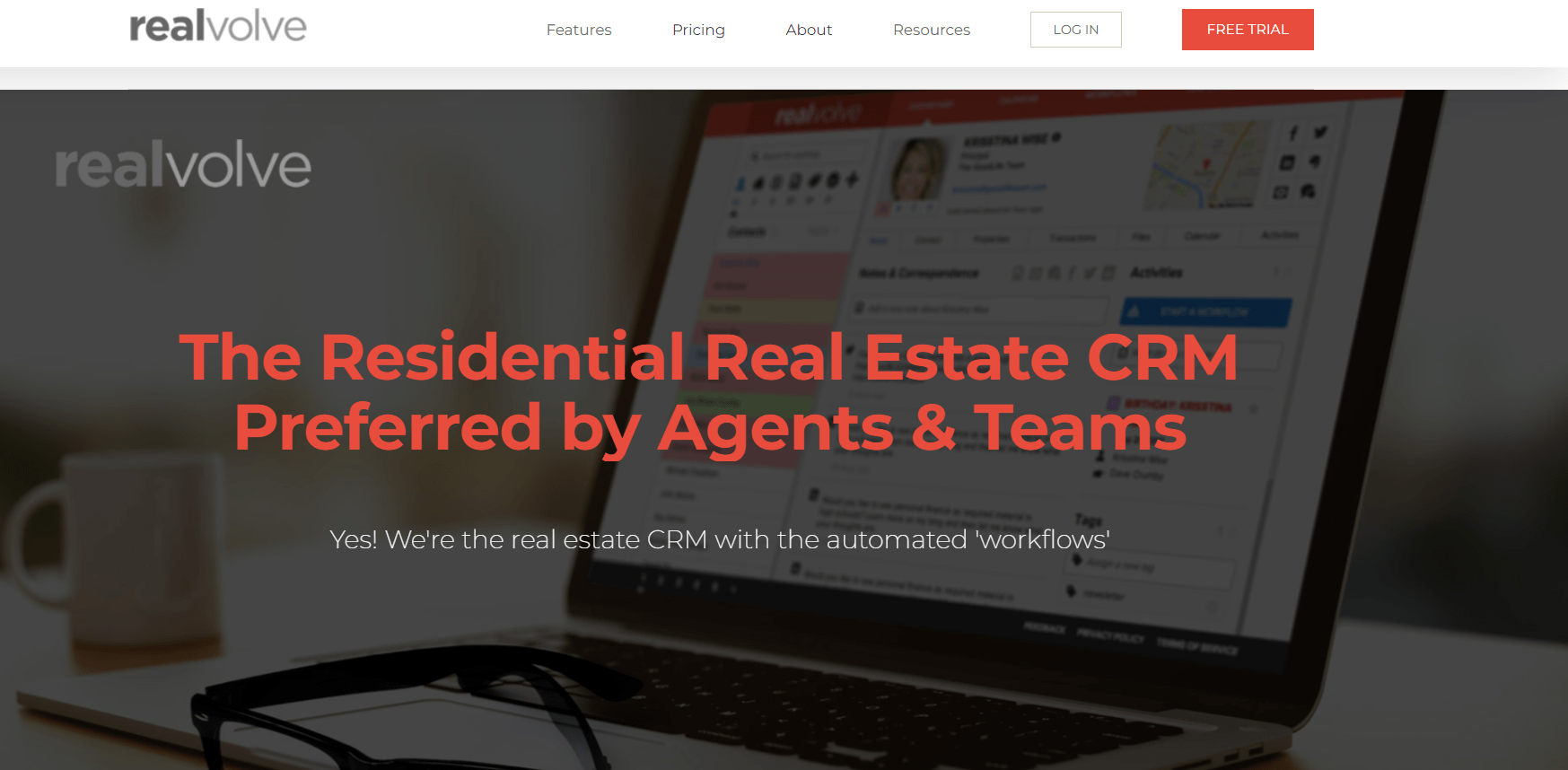
Overview: Realvolve combines CRM functionality with workflow automation to help real estate agents manage their business processes efficiently.
Key Features:
- Customizable Workflows: Allows agents to create and manage workflows tailored to their business processes.
- Email and Text Message Automation: Automates communication with leads and clients through scheduled emails and texts.
- Detailed Contact Profiles: Maintains comprehensive profiles for contacts, including notes, communication history, and property preferences.
- Task and Transaction Management: Helps agents manage tasks, appointments, and transactions to ensure smooth operations.
Pros:
- Strong workflow automation
- Comprehensive feature set
- Excellent customer support
Cons:
- Higher cost for small teams
- Can be complex to set up
Best for: Agents and teams who need advanced workflow automation and are willing to invest in a comprehensive CRM.
11. Salesmate: Best Real Estate CRM for Realtors
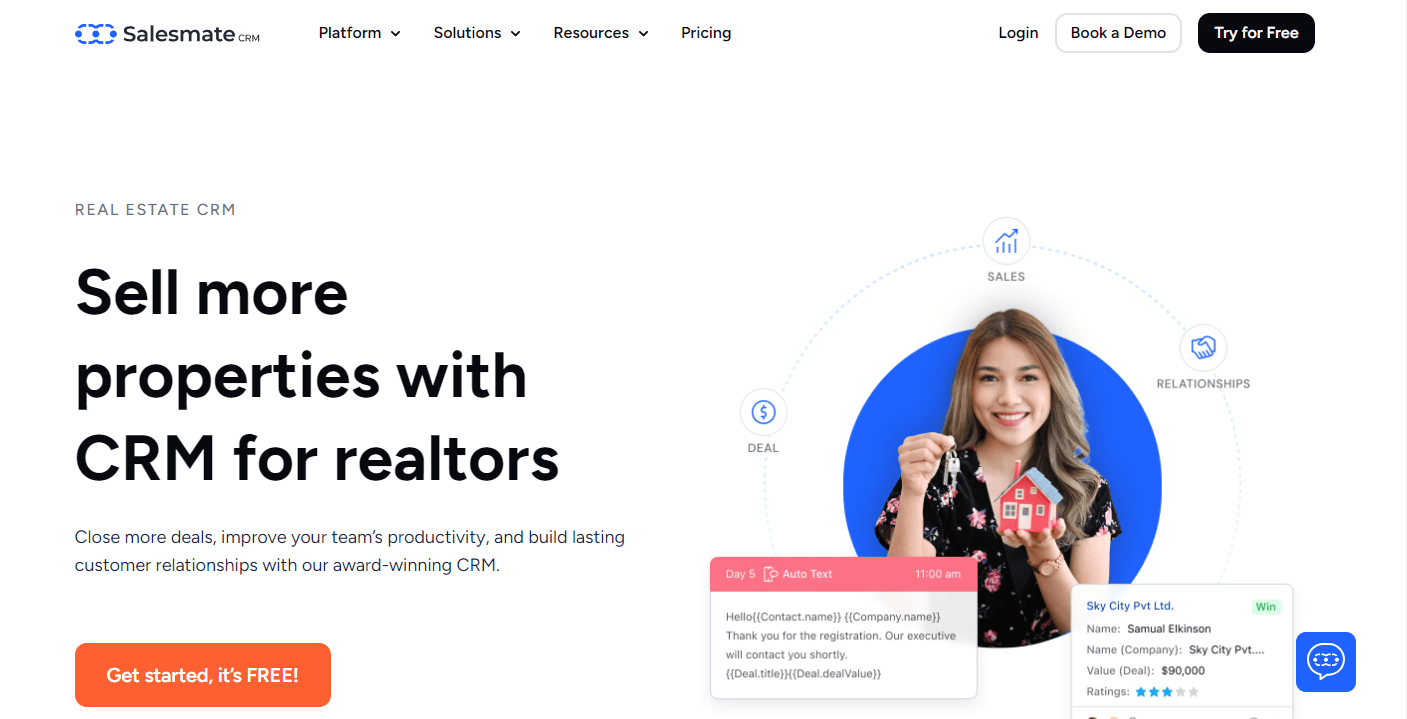
Overview: Salesmate CRM is designed to streamline sales processes for real estate agents, offering robust tools for managing leads, clients, and transactions.
Key Features:
- Pipeline Management: Visualizes the sales process with customizable stages and drag-and-drop functionality, making it easy to update lead status.
- Automated Workflows: Automates repetitive tasks, follow-ups, and notifications, ensuring agents stay on top of their tasks.
- Built-in Calling and Texting: Allows agents to communicate directly from the CRM, with call logging and tracking for accountability.
- Email Campaigns: Enables the creation, sending, and tracking of email campaigns to engage with clients effectively.
- Contact Management: Provides detailed contact profiles with notes, communication history, and property preferences.
Pros:
- User-friendly interface
- Strong automation capabilities
- Integrations with popular real estate tools
Cons:
- May require a learning curve for new users
- Advanced features might be more costly
Best for: Agents and teams looking for a feature-rich CRM Software with strong automation and communication tools.
12. LeadSquared: Real Estate CRM with Marketing Automation
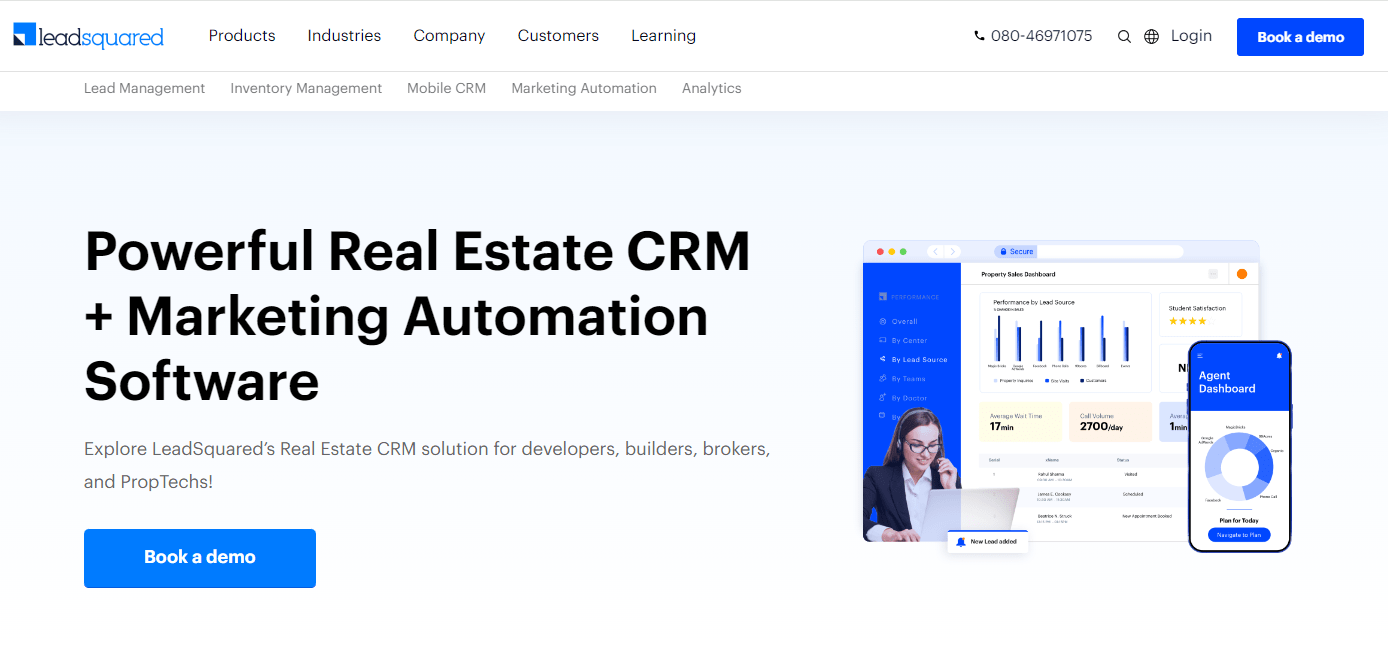
Overview: LeadSquared is a comprehensive CRM platform that offers advanced lead management and marketing automation features tailored for real estate professionals.
Key Features:
- Lead Capture and Management: Captures leads from various sources and provides tools for tracking and nurturing them through the sales funnel.
- Marketing Automation: Automated email campaigns, lead nurturing sequences, and other marketing activities to keep leads engaged.
- Customizable Workflows: Allows agents to create and manage workflows that match their specific sales processes.
- Analytics and Reporting: Offers detailed insights into lead sources, campaign performance, and sales activities, aiding data-driven decision-making.
- Mobile CRM: Provides a mobile app for managing leads, tasks, and communications on the go.
Pros:
- Strong lead management features
- Comprehensive marketing automation
- Detailed analytics and reporting
Cons:
- Can be complex to set up and configure
- Higher cost for smaller teams
Best for: Real estate teams and agencies looking for advanced lead management and marketing automation features.
13. IXACT Contact: Best CRM for Real Estate Marketing and Automation
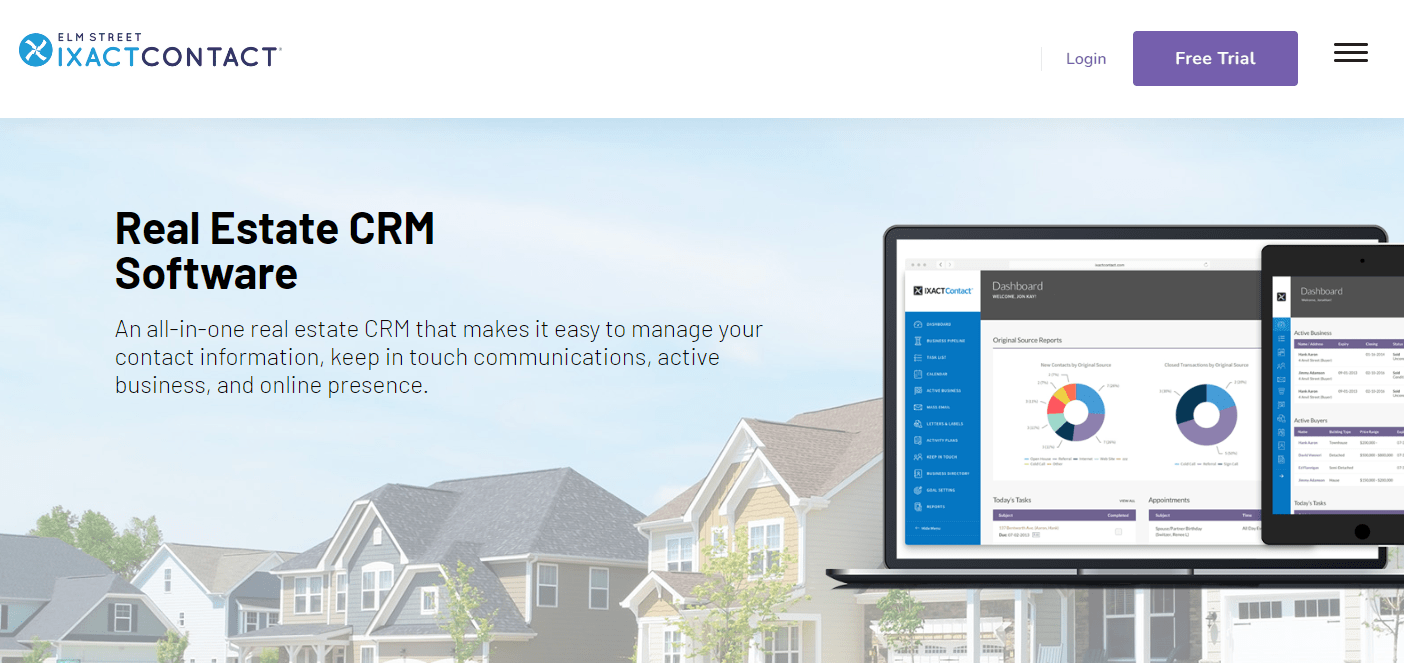
Overview: IXACT Contact is a CRM designed specifically for real estate agents, focusing on marketing automation and contact management. It offers a comprehensive suite of tools to help agents stay organized and grow their business.
Key Features:
- Email Marketing: Create and send professional email newsletters and drip campaigns to nurture leads and keep clients engaged.
- Contact Management: Maintain detailed profiles for each contact, including personal details, communication history, and property preferences.
- Lead Capture: Automatically import leads from your website, social media, and other sources.
- Task and Calendar Management: Schedule and manage tasks and appointments to ensure timely follow-ups.
- Website Integration: Includes a customizable, mobile-friendly agent website with lead capture forms.
- Automated Reminders: Set up automated reminders for important tasks and follow-ups.
Pros:
- Strong focus on marketing automation
- Easy to use and set up
- Excellent customer support
- Affordable pricing
Cons:
- Limited advanced features
- Basic reporting capabilities
Best for: Agents who prioritize marketing automation and need an affordable, user-friendly CRM.
14. RealtyJuggler: Best Affordable CRM for Real Estate
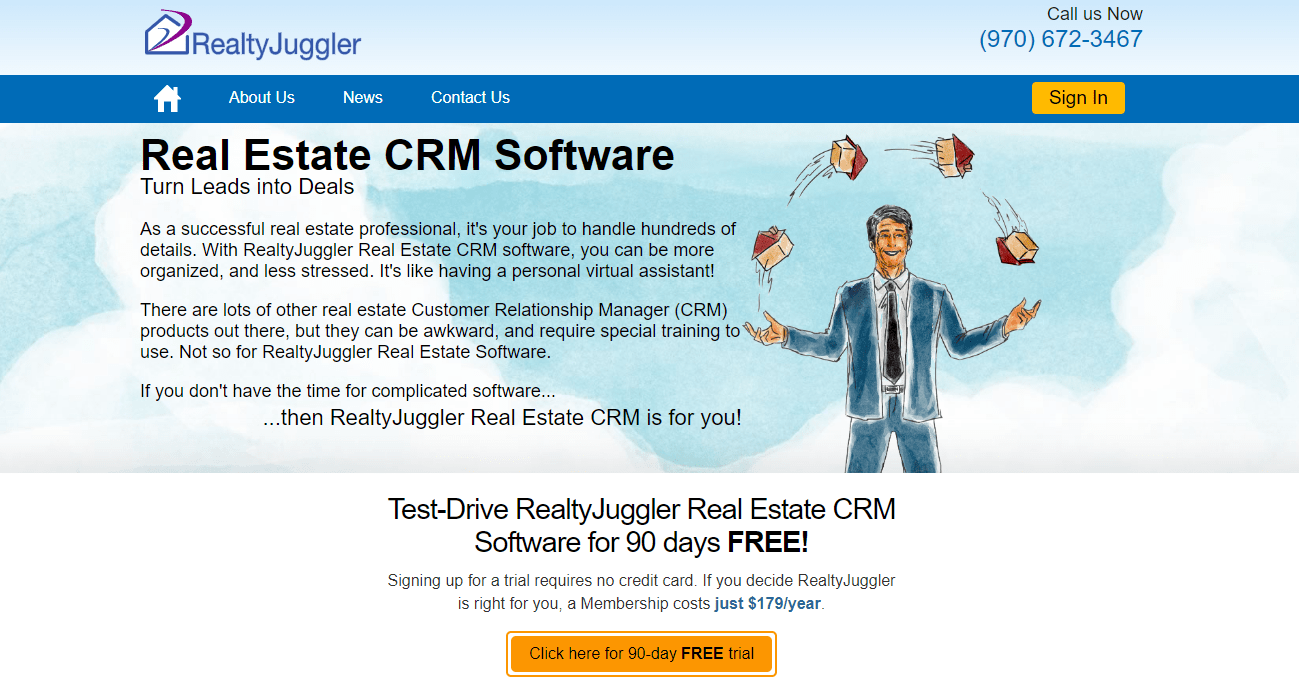
Overview: RealtyJuggler is a budget-friendly CRM designed for real estate agents, offering essential features for managing leads, contacts, and transactions without breaking the bank.
Key Features:
- Contact Management: Keep detailed records of client information, communication history, and property preferences.
- Task and Appointment Scheduling: Manage tasks and appointments to stay organized and ensure timely follow-ups.
- Email Templates: Use pre-designed email templates for newsletters, follow-ups, and other communications.
- Transaction Management: Track transactions from initial contact to closing, including all relevant documents and details.
- Drip Campaigns: Set up automated drip campaigns to nurture leads over time.
Pros:
- Very affordable pricing
- Easy to use
- Comprehensive contact management
- Good for transaction tracking
Cons:
- Limited advanced features
- Basic interface design
Best for: Individual agents and small teams looking for a cost-effective CRM solution.
15. RealOffice360: Best CRM Software For Real Estate Workflow Management
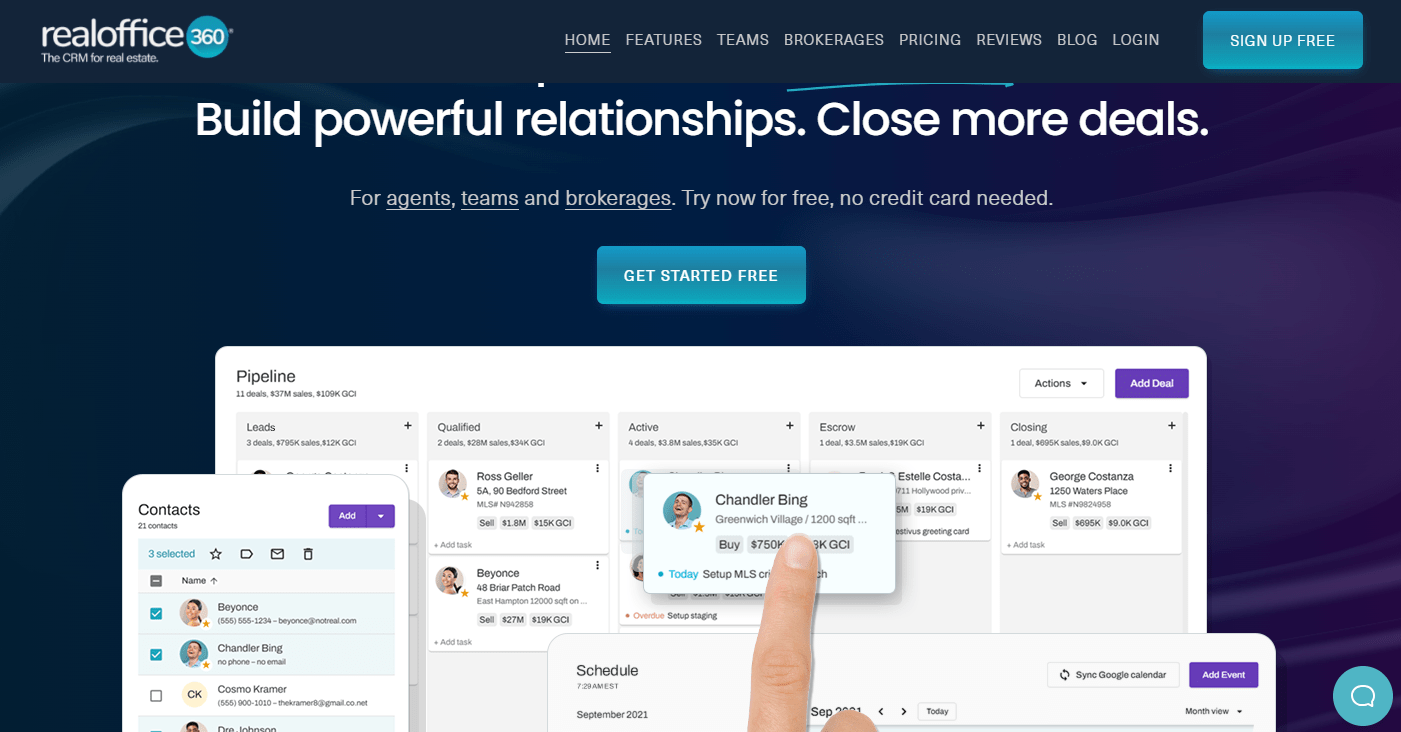
Overview: RealOffice360 offers a CRM Software For Real Estate tailored, focusing on workflow management and client relationship building. It provides tools to streamline business processes and enhance client interactions.
Key Features:
- Client Management: Maintain detailed client profiles, including personal details, communication history, and property preferences.
- Pipeline Management: Visualize and manage your sales pipeline with customizable stages and tasks.
- Task and Goal Setting: Set and track goals, tasks, and deadlines to stay organized and focused.
- Deal Tracking: Monitor the progress of deals from initial contact to closing.
- Marketing Automation: Automate marketing tasks and campaigns to keep clients engaged and generate new leads.
- Reporting and Analytics: Generate reports to gain insights into sales performance and business growth.
Pros:
- Strong focus on workflow and goal management
- User-friendly interface
- Good for client relationship building
- Affordable pricing
Cons:
- Limited integrations with third-party tools
- Basic marketing features
Best for: Agents and small teams looking for a CRM with strong workflow and client management capabilities.
How to Choose? Real estate CRM Software
Choosing the best Real estate CRM software for real estate company is essential for properly handling leads, clients, properties, and transactions. Here are some guidelines to help you choose the finest CRM software for your real estate company:
Define Your Needs and Goals:
Determine your specific needs and goals. Are you primarily involved in residential or commercial real estate? Do you require property management, lead generating, or marketing automation features? Understanding your specific requirements will lead your CRM selection.
User-Friendly Interface with Cost-effective Budget:
Choose a CRM with an intuitive and user-friendly interface. Your team should be able to quickly adapt to the software without extensive training. Establish a CRM software budget that includes setup, monthly subscription fees, and any customization charges. Balance the cost with the expected benefits and ROI the CRM can provide.
Reporting and Analytics:
Comprehensive reporting and analytics tools are critical for monitoring the success of your organization, identifying areas for development, and making data-driven choices. Look for a CRM that offers insights into lead conversion rates, sales trends, and agent performance, allowing you to fine-tune your success methods.
Mobile Accessibility:
Real estate agents are often on the go, showing properties, meeting clients, and attending events. Choose a CRM that offers mobile access, either through a dedicated app or a responsive mobile website, to guarantee that your staff can access and update critical information while on the go.
Customization and integration:
Choose a CRM that can be customized to meet your specific needs. Because real estate organizations may have unique workflows and processes, the software should be adaptable to your requirements. It should also integrate seamlessly with other critical tools and platforms like email, Social media , and property listing websites.
Future Trends for CRM in real estate industry
The real estate market is always changing, and customer relationship management (CRM) solutions play an important role in helping real estate professionals in better understanding and serving their clients. Here are some CRM future trends in the real estate industry:
AI-Powered Predictive Analytics: CRM Software For Real Estate will increasingly rely on artificial intelligence (AI) and machine learning to give predictive analytics. These systems will help real estate agents in identifying possible buyers and sellers by evaluating past data and forecasting future property transactions. This can help to expedite lead creation and increase conversion rates.
Chatbots and AI Assistants: Chatbots and AI-powered virtual assistants will become essential components of CRM systems. They will handle routine inquiries, schedule appointments, and provide property information 24/7, enhancing client service and freeing up agents’ time for more complex tasks.
Blockchain for Secure Transactions: Blockchain technology can be used in CRM systems to enable secure and transparent property transactions. It can help speed up the purchasing and selling process, decrease fraud, and increase trust between parties.
Mobile-First CRM: Mobile-first CRM applications will rule, allowing real estate professionals to manage leads, engage with clients, and access essential data while on the go. Location-based services will be supported by mobile apps, making it easier to show properties to potential buyers.
5G Connectivity: The deployment of 5G networks will allow for faster data transfer that will improve the capabilities of CRM Software For Real Estate. This will support Real-time video conferencing, high-quality virtual property tours, and faster data synchronization.
SalesTown CRM Software to Grow Your Real Estate Business
SalesTown CRM is the ultimate tool to grow your real estate business. This powerful software keeps everything organized and streamlined, so you can focus on what matters most – selling properties and serving clients.
With SalesTown CRM, you can:
- Stay on top of your leads and prospects with easy tracking and management tools.
- Automate follow-ups and reminders, so no opportunity slips through the cracks.
- Keep all your customer information and interactions in one place, accessible anytime, anywhere.
- Gain valuable insights into your performance and the market with advanced analytics.
- Boost your productivity and efficiency with a user-friendly interface.
SalesTown CRM is designed to help real estate professionals like you achieve outstanding results. Don’t miss out on this game-changing solution. This is not it here
SalesTown CRM offers a comprehensive marketing solution for real estate businesses:
- Seamless WhatsApp API integration
- Message creation and automation
- Bulk messaging and personalization
- Conversation management within CRM
- Built-in email campaign creator
- Design customizable email templates
- Segment contacts for targeted campaigns
- Schedule and automate email sends
- Track email performance (open rates, clicks)
With Salestown CRM, real estate businesses can efficiently run both WhatsApp and email marketing campaigns from a single platform, leveraging CRM data for more effective, personalized communication with clients and leads.
Read more about: benefits of email marketing
Take the first step today by scheduling a free Demo
Frequently Asked Questions ( Faqs ) CRM for Real estate
1: What is a CRM for real estate Investors?
In simple terms, a CRM Software For Real Estate centralizes and manages all the contacts, communications, transactions, and other interactions that real estate agents, brokers, and other professionals have with their clients. It creates a searchable database of all current and past clients as well as new leads.
2: What are the important benefits of CRM for Real estate Investors?
Real estate Customer Relationship Management (CRM) systems offer crucial benefits by streamlining and organizing interactions with clients and leads. These platforms enhance communication, track property details, and automate routine tasks, allowing real estate professionals to manage their business more efficiently. With centralized data storage, agents can access information anytime, fostering better client relationships and improving overall productivity. Additionally, CRM Software often include tools for marketing, analytics, and reporting, providing valuable insights that help real estate professionals make informed decisions and stay ahead in a competitive market.
3: What should I look for in a real estate CRM investor?
When choosing a CRM Software For Real Estate, look for user-friendly interfaces, as it should be easy to navigate. Ensure that it offers essential features like contact management, task tracking, and communication history. Integration capabilities with other tools and platforms, as well as mobile accessibility, are key factors to consider for a comprehensive and flexible CRM solution. Additionally, check for customer support options to address any questions or issues that may arise during your use of the CRM.
4: How many real estate agents use a CRM?
According to industry estimates, approximately 50-70% of real estate agents and brokers currently use some form of customer relationship management (CRM) technology to organize contacts and leads. However, a sizable 30-50% still rely on basic spreadsheets or non-specialized software. As competition rises, it’s projected over 90% of real estate professionals will adopt targeted CRM platforms within the next few years.


